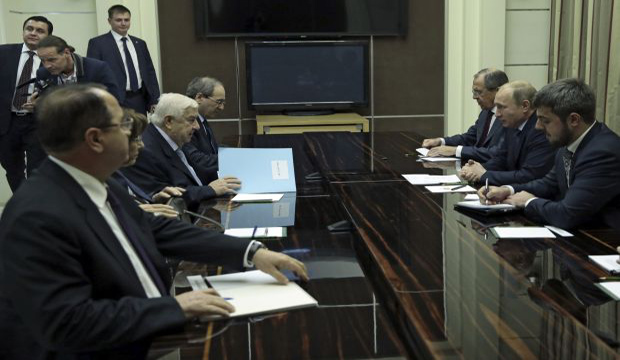
Syria’s Foreign Minister Walid Al-Mouallem (3rd L) speaks to Russia’s President Vladimir Putin (2nd R) and Foreign Minister Sergey Lavrov (3rd R) during a meeting in Sochi on November 26, 2014. (Reuters/Mihail Metzel)
Moscow, Asharq Al-Awsat—Moscow has proposed a new round of negotiations, dubbed Geneva III, between the Bashar Al-Assad government and the Syrian opposition, during a state visit to Russia by Syrian Foreign Minister Walid Al-Mouallem, well-informed Russian sources told Asharq Al-Awsat.
The call for a new round of negotiations between the Syrian regime and the Western-backed rebels fighting to oust Assad comes at a time when the situation on the ground in Syria has changed significantly since the stalled Geneva II talks, following the advance of the Islamic State of Iraq and Syria (ISIS) across large parts of the country.
A Russian diplomatic source, speaking to Asharq Al-Awsat on the condition of anonymity because he was not authorized to brief the media, said that during Mouallem’s visit Moscow had stressed “the necessity of committing to the Geneva Communiqué signed on June 30, 2012, including its provisions regarding a cessation of hostilities and transition to dialogue as a prelude to forming a coalition government.
“The Russian side also put forward the idea of Geneva III,” the source added.
UN-backed Geneva II talks were held between 10 and 15 February earlier this year and produced no tangible results, with each side accusing the other of obstructing the peace talks.
Speaking at a press conference following his meeting with Russian counterpart Sergey Lavrov, Mouallem confirmed that both sides had discussed the idea of holding inter-Syrian dialogue. “I listened with great interest to those ideas as we agreed to continue consultations to put a joint vision leading to a political solution in Syria,” Mouallem said according to Syrian state news agency SANA.
Russian President Vladimir Putin met with Syria’s foreign minister in Russia’s Black Sea resort of Sochi, with Kremlin spokesman Dmitry Peskov confirming only that Putin and Mouallem had discussed “bilateral relations.” Moscow also pledged to continue to support the Assad regime to combat “terrorism” in the Middle East, in a statement that many observers believe indicates that Russia is unlikely to curb its backing of the Damascus regime at this late stage.
Since the start of the Syrian uprising in March 2011 the Syrian regime has described pro-democracy protesters as “terrorists.”
“We share the view that the main factor driving the situation in the Middle East is the terrorist threat. Russia will continue supporting Syria . . . in countering this threat,” Lavrov told a joint news conference in Sochi.
This is the first time that Putin has met with Mouallem since March 2011.
